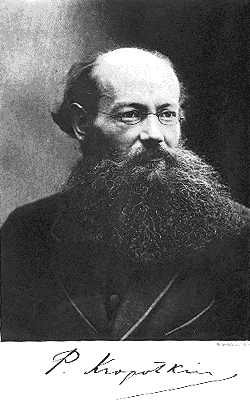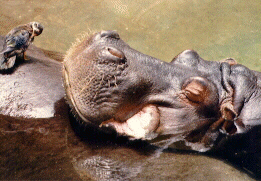Petr Kropotkin
Today, a gentle Russian offers something better than combat. The University of Houston's College of Engineering presents this series about the machines that make our civilization run, and the people whose ingenuity created them.
Petr Kropotkin was born a Russian Prince in 1842. His father trained him for the Tsar's court. But Kropotkin had read Darwin's new book, Origin of Species. He wanted to be a scientist. He hated court politics. He finally quit and joined a Cossack regiment in Siberia.
There he was free to study life in a natural environment. For five years he served as a geographer and naturalist. The Siberian wilds gave him far better lessons in social organization than the Russian court had.
He joined the Imperial Geographical Society in 1868. He made more trips. In 1870 he turned down the cushy post of Society secretary and left Petersburg again. This time he went to Europe to study anarchy. You and I bend the word anarchy to mean chaos. But what anarchists claim is that individuals organize society by working together -- cooperatively and voluntarily.
Imperial Europe didn't like the idea that imperial rule is unnecessary. So Kropotkin spent time in jails. He finally found a safe haven in England. There he worked as a science writer.
Meanwhile Darwin's influence grew. Tennyson called nature "red in tooth and claw." In 1888 Huxley wrote a harsh essay on survival of the fittest: "The Struggle for Existence." We starting seeing our lot through distorted Darwinian lenses. We started believing that life is a blood sport.
Both capitalists and the new Marxists bent Darwin to fit their ends. Kropotkin reacted with articles. He showed that cooperation is our primary survival strategy. He wrote:
Life in societies enables the feeblest animals, the feeblest birds, and the feeblest mammals to resist, or protect themselves from the most terrible birds and beasts of prey;
He showed how acts of mercy and mutual support were part of all insect, animal, and human societies. In 1902 he wove his studies into a powerful lucid book. He called it Mutual Aid.
Kropotkin had once supported the Russian revolution. But, as Marxists turned up their Darwinian rhetoric, he withdrew. Before his death in 1921, he wrote to Lenin. "Vladimir Ilych," your actions are [unworthy of your ideals]."
Today we're finding Kropotkin's modes of cooperation far more subtly active in our ecology than we'd once thought. We're finding new hope in his anarchist notion that a society
... which organizes itself without authority, is always in existence. [It is] like a seed beneath the snow.
For it is you and I who shape our world. Our cooperation and interaction have far more say than government does. We form our world. We do so simply by working together -- and by cherishing one another.
I'm John Lienhard, at the University of Houston, where we're interested in the way inventive minds work.
(Theme music)
Kropotkin, P., Mutual Aid: A Factor of Evolution. (with an introduction by George Woodcock), New York: Black Rose Books, 1989.
See also the Encyclopaedia Britannica article on Kropotkin.
I'm grateful to the Rev. Bill Cobb for drawing my attention to Kropotkin's work.
For more on Kropotkin and his ideas, see Episodes 1036 and 947.

Image courtesy of Special Collections, UH Library
Petr Kropotkin, from Memoirs of a Revolutionist, 1899

photo by John Lienhard
Mutual aid and cooperation are hallmarks of animal life